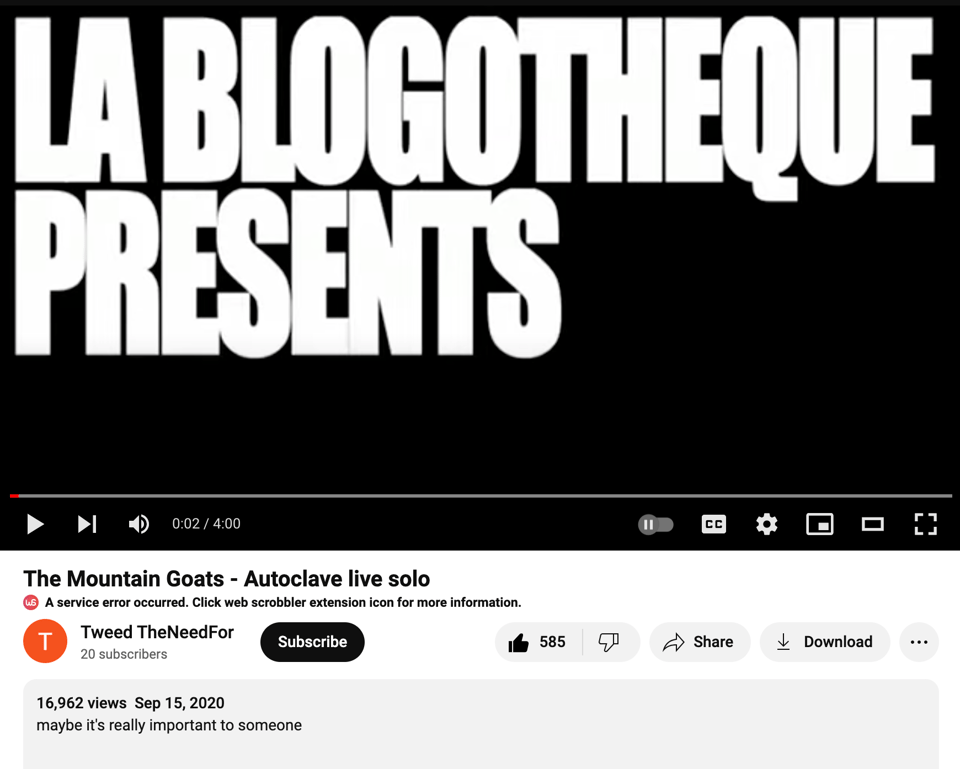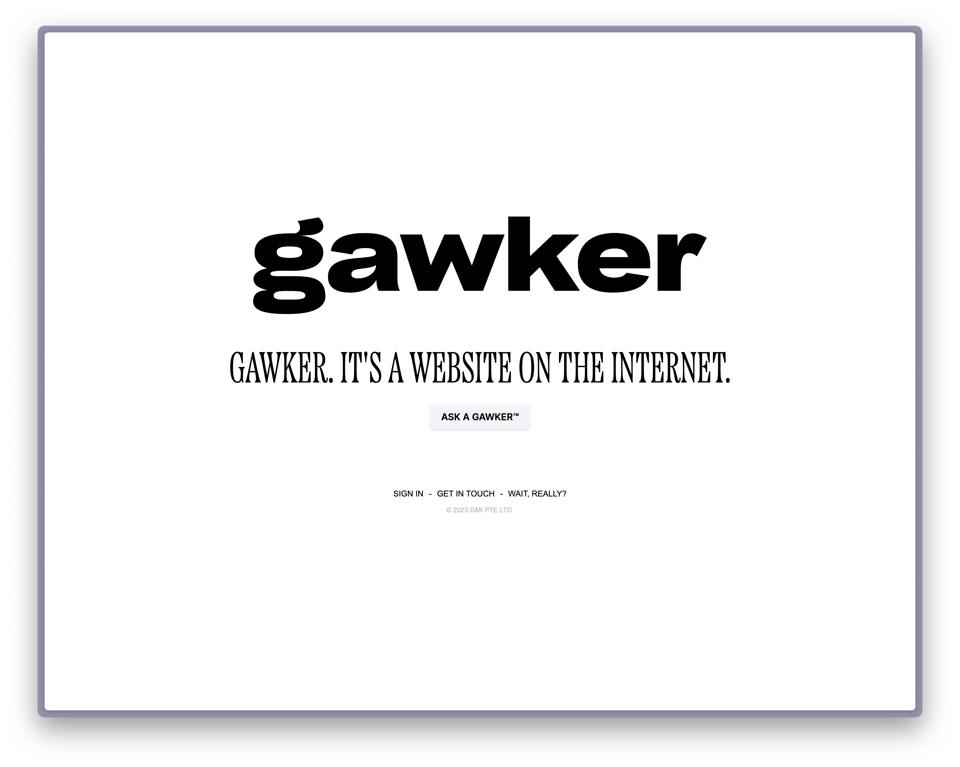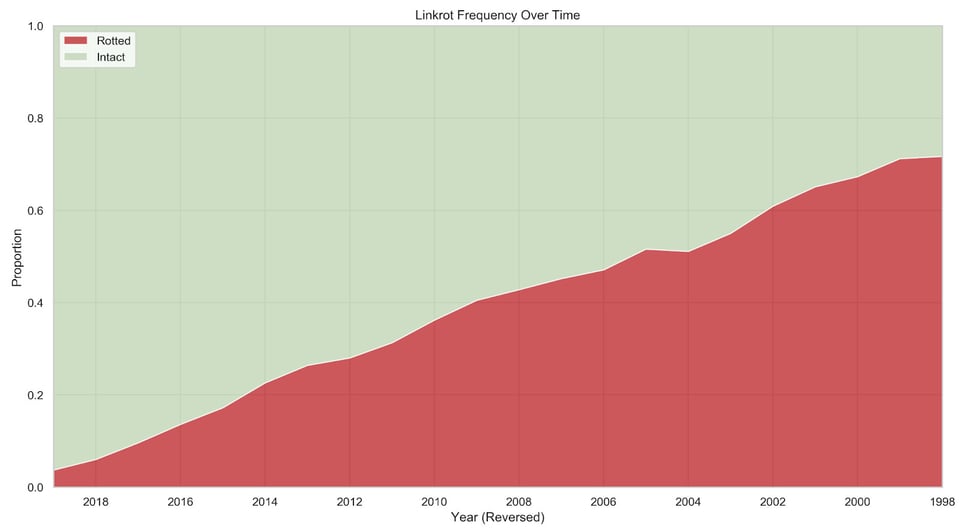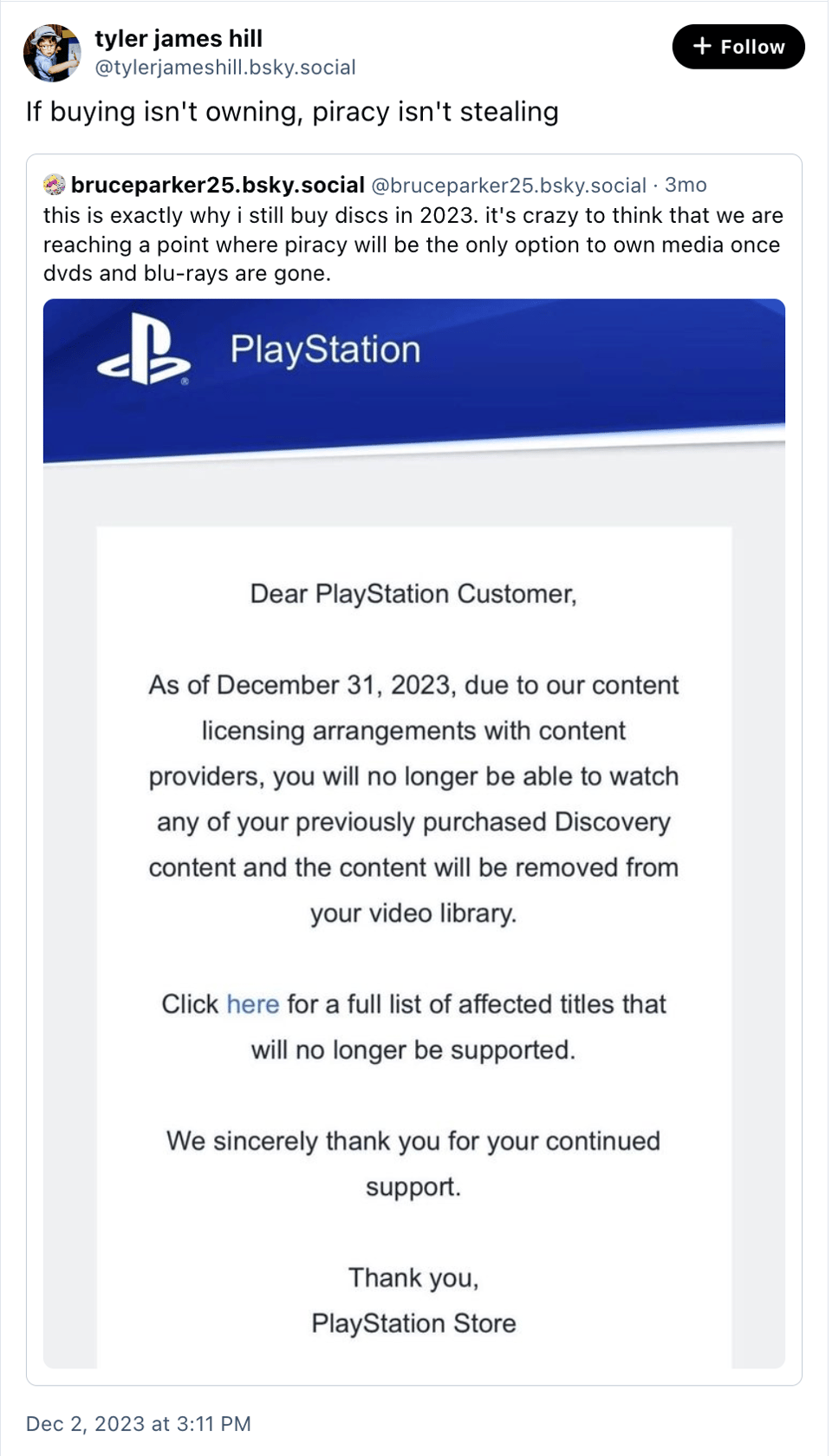#6 - maybe it's really important to someone
One of my favorite videos on the internet is, technically, pirated content. It’s this live performance of ‘Autoclave’ by the Mountain Goats, performed next to Seattle’s Fremont Troll. It was recorded by S. Viehmann in 2008. In September of 2020, when we were all hiding in our homes, youtube user ‘Tweed TheNeedFor’ uploaded a bootleg with the simple description “maybe it’s really important to someone.”

As I’m writing this, the video has 17,044 views of which I’m at least 500. When I was at my lowest during college I would watch this video over and over and weep. Safe to say, this video is important to me. And it’s there because this blessed soul had the notion to bootleg it.
After some digging, I found the original upload on Vimeo, and a backup on archive.org. This video is safe, but that’s largely because Mountain Goats fans like me and Tweet TheNeedFor are so moved by it that we feel the need to preserve it. But that’s the exception, not the rule.
The internet is rotting. Some of that is due to corporate mismanagement, some from simple neglect.
Gawker.com, which used to host hundreds of articles, now shows you a bare-bones holding page. So does The Messenger, a news start-up that folded this January after less than a year in operation. In both instances, corporate owners decided they were done funding journalism, so they pulled the plug on both writers and their web archive.

In the past couple years, streaming services have started to delete shows off of their platforms. Max (formerly HBOMax), has removed at least 87 titles, including critically acclaimed shows like Westworld, Infinity Train, and OK KO: Let’s Be Heroes. NowThis News has quietly deleted over 1000 videos from their youtube archive. And those are the high profile incidences. Activist group Archive Team, who describe themselves as “a loose collective of rogue archivists, programmers, writers and loudmouths dedicated to saving our digital heritage,” have a list of dead websites here.
When I was a kid, I was told the internet was forever. Anything you posted could or would be up forever. And that’s not true. Every site is hosted by a person and when people run out of money or interest, they delete webpages. When that happens, any links to that page stop working. This is a huge problem for people (like journalists and video creators) who need to be able to link to their old work when applying for jobs.
Turns out, this is an old issue. It’s called:
Linkrot
Basically, the phenomenon where links break over time. I found an old blog post that claims that 6% of the links on the web were broken in 1998. And it’s only gotten worse. According to a 2021 study by Harvard Law School, around 25% of the links to external webpages in the New York Times archive are dead. The older the link, the higher the chance of it being broken.

Some of that happens because the website owner deletes the content. Some happens because they changed some URLs around. For instance, I could change the URL of last week’s newsletter. If I did, the archive of that newsletter would still exist on the internet, but all the links to it that I sent my friends would break.
In a lot of ways hyperlinks are the internet. If I send one of these newsletters where all the links don’t work, I sent a very different newsletter. You can’t check my sourcing, you can’t investigate further. Hyperlinks are the strands of the world wide web. Cut the strands and the web falls apart.
The Digital Microfiche
The Internet Archive (archive.org) runs a service called the Wayback Machine that archives old websites. Some of this happens automatically- they have a web crawler that finds sites through links on other sites. If a site is linked to, the crawler can use that strand to find the webpage and take a capture of it.
On the Wayback Machine, you can still read the archives of Gawker and The Messenger.
Earlier this week, Vice announced that it was laying off hundreds of people, almost their entire staff. There’s a high chance of them deleting the site and the archive, so staffers scrambled to archive their writing. Luckily, Archive Team spent six months last year archiving the entire Vice website in every language that they published in. That backup is hosted on the Internet Archive now.
The only issues with Wayback Machine's archive is that pages load slowly and most of the images don’t work. For instance, here’s what former Vice staffer Matthew Gault’s staff page looks like:

All of the links on the archived page work (they lead to archives of the pages they link to) but the video and image embeds are largely un-viewable. So it’s not really the same.

I don’t fully understand the technical challenges behind archiving images, but I know the big challenge for videos is copyright. If they wanted to properly archive this article about Starship Troopers, they would have to download and upload copyrighted footage. Which is piracy. That’s fairly innocuous when individual users do it (the movie clip in that article was uploaded by Youtube User “Video Quoter” eight years ago and it hasn’t been taken down) but if a large charity like the Internet Archive was downloading and re-uploading huge amounts of copyrighted material, they could be sued out of existence.
So what are we supposed to do if we want to save the internet?

Piracy as Archival Work
Since shows like Infinity Train and OK KO were removed from Max, their show creators have been remarkably cool with fans pirating their shows. Because fundamentally, when you “buy” a show on a digital distribution service, you don’t buy the file or anything. You actually buy the license to watch the show on someone else’s server. So if they decide to delete the show off of that server, you will lose access even if you paid for it. Or if they decide to change the license.
For instance, this happened to Playstation owners two months ago, when hundreds of purchased shows were removed from user’s libraries.
If even "purchased" shows can be deleted, the only way to preserve culture is to take it for ourselves. As Tyler James Hill wrote:

These corporations fundamentally do not think of themselves as cultural stewards. For them, art and writing and film and everything else they misplace into the abysmal category of ‘content’ is a means to an end. There are shows that have done well and won awards that were cancelled (Netflix’s City of Ghosts for instance). There are shows that almost nobody has watched that got multiple seasons (did you know there’s three seasons of a show about Batman’s butler). If we want to preserve the culture of cyberspace, we're going to have to do it ourselves.
Going forward:
Install the Wayback Machine chrome extension. When you read something you enjoy online, use the extension to archive that page. Link
If you have a website or blog, check your old links occasionally. If the page you’re sending people to no longer exists, then replace the old link with a Wayback Machine archive.
When you find videos or images you love, download them. If they get permanently deleted, upload them to the Internet Archive.
All in all, save things if you can, steal them if you must. But do everything in your power to preserve digital culture. After all,

Further Reading: